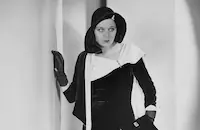While Paris Sleeps
Cast & Crew
Allan Dwan
Victor Mclaglen
Helen Mack
William Bakewell
Jack La Rue
Rita La Roy
Film Details
Technical Specs

Synopsis
Fifteen years after Jacques Costaud, a French war veteran and a recipient of France's prestigous Croix de Guerre, kills a man and is sentenced to life in prison, he escapes from a penal colony in French Guyana. Jacques is chased by police and dogs through darkness and heavy brush. Dodging police bullets, Jacques jumps into a swamp, and is listed as dead by the police. After Jacques slips out of Guyana, he returns to Paris, where his daughter Manon now lives. While searching for Manon, Jacques re-reads the last letter that he received from his wife, who died during his imprisonment, and is saddened when he remembers that Manon has been told that he had died in the war. The letter also mentions that Manon was given her father's medal as a keepsake. After spending all her money on her mother's funeral, the destitute Manon is evicted from her apartment because she cannot pay her rent. Manon's room is rented to Paul Renoir, who discovers Manon still in her room and, after hearing her hard luck tale, agrees to let her stay there. Paul then finds Manon work in a bar, where she will work "while Paris sleeps." When Jacques finds his daughter's apartment, he learns about Manon's troubles from the concierge and decides to remain in the shadows until he can help her. At the bar where Manon works, Jacques witnesses a patron assaulting her, and when he intervenes on her behalf a fight ensues. Later, Jacques follows Manon to a church and watches her light candles in memory of her dead parents. He then re-reads the portion of his wife's last letter asking him never to reveal his criminal past to Manon because it would break her heart. When Paul overhears the unscrupulous Julot and Kapas trying to convince Manon to go to South America to "model," he bursts into the room and starts a fight. Paul later kisses Manon and promises to kill anyone who harms her. After witnessing Paul's act of bravery, Jacques introduces himself to Manon as a friend of her father, and gives Paul his consent to marry her. He also promises to come up with money to support them. Jacques returns to Manon's apartment with a bundle of money that was owed to his wife, only to discover that Manon and Paul have been kidnapped. While Julot threatens to kill Manon unless she agrees to go to South America, Jacques reports the kidnapping to the police. The police mistake Jacques for the abductor and arrest him, but he frees himself in time to rescue Manon. Manon and Jacques then rescue Paul and detain the gangsters until the police arrive. Once he is assured that his daughter and Paul are safe, Jacques decides that "the dead must remain dead," and kills himself by entering a dynamite-laden basement that is about to explode. Some time later, at the tomb of the unknown soldier, Manon lays flowers in memory of a father she thinks she never knew.

Director

Allan Dwan
Cast

Victor Mclaglen
Helen Mack
William Bakewell

Jack La Rue

Rita La Roy
Maurice Black
Dot Farley

Lucille La Verne
Paul Porcasi
Eddie Dillon
Arthur Stone
Martin J. Faust
Earl Pingree
Dolores Johnson
Crew
Rowland Brown
William Darling
Guy S. Duty
Allan Dwan
Jules Furthman
James F. Hanley
Horace Hough
Jed Kiley
George Leverett
Glen Macwilliams
Doris Malloy
Jack Murray
Dudley Nichols
Earl Rettig
William Sistrom
Fred Spencer
Paul Weatherwax
Basil Woon

Film Details
Technical Specs

Quotes
Trivia
Notes
Film Daily pre-release news items list Claire Maynard and Gertrude Astor in the cast, but their appearance in the released film has not been confirmed. The file on While Paris Sleeps in the MPAA/PCA Collection at the AMPAS Library indicates that the Hays Office, after viewing the film in January 1932, told Fox that the film was in violation of the Production Code because of its treatment of "White Slavery." Although the Hays Office stated its regret that "an investment is jeopardized," it informed the studio that had the script been submitted to the office for review prior to filming, the unfortunate situation would not have arisen. Following a series of meetings between Hays Office officials and Fox producers, the studio agreed to reshoot the scenes in question, and production resumed in February 1932. According to a letter contained in the MPAA/PCA file, a Hays Office official noted that Fox "severely censured" staff members who "allowed the picture to reach its completed form without first having checked with us." Following the release of the film, Paul Claudel, a representative of the French Embassy in Washington, sent a lengthy letter to the Hays office, protesting, among other things, the film's presentation of Paris as an "underworld...infested by gangsters who have the practice of burning alive, in a large furnace, either their victims or their confederates." In 1938, when the film was submitted to the PCA for re-issue certification, the PCA informed Fox that because the picture contained "a number of definitely unacceptable details," it should be withdrawn from consideration.












